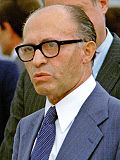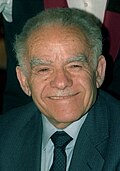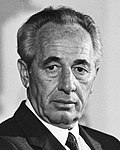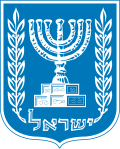| No. | Name
(Lifespan) | Portrait | Political party | Term of office | Elected
(Knesset) | Government |
|---|
| No. | Composition |
|---|
| 1 | David Ben-Gurion
(1886–1973) |  | Mapai | 14 May 1948 | 10 March 1949 | — | Prov. | Mapai • Mapam • HHaM • New Aliyah • S&O • Mizrachi • Gen.Zionists • Aguda |
| 10 March 1949 | 1 November 1950 | 1949 (1st) | 1st | Mapai • URF • Progressives • S&O • DLN |
| 1 November 1950 | 8 October 1951 | 2nd |
| 8 October 1951 | 24 December 1952 | 1951 (2nd) | 3rd | Mapai • Mizrachi • HHaM-Aguda-PAY • DLIA-P&W-A&D |
| 24 December 1952 | 7 December 1953 | 4th | Mapai • Gen.Zionists • Progressive • Mizrachi • HHaM • DLIA-P&W-A&D |
| 2 | Moshe Sharett
(1894–1965) |  | Mapai | 7 December 1953 | 26 January 1954 |
| 26 January 1954 | 29 June 1955 | 5th |
| 29 June 1955 | 3 November 1955 | 6th | Mapai • Mizrachi • HHaM • DLIA-P&W-A&D |
| (1) | David Ben-Gurion
(1886–1973) |  | Mapai | 3 November 1955 | 7 January 1958 | 1955 (3rd) | 7th | Mapai • NRP • Mapam • AHaA • Progressives • DLIA-P&W-A&D • P&D-C&B [a] |
| 7 January 1958 | 17 December 1959 | 8th |
| 17 December 1959 | 2 November 1961 | 1959 (4th) | 9th |
| 2 November 1961 | 26 June 1963 | 1961 (5th) | 10th | Mapai • NRP • AHaA • PAY • P&D-C&B |
| 3 | Levi Eshkol
(1895–1969) |  | Mapai | 26 June 1963 | 22 December 1964 | 11th |
| 22 December 1964 | 12 January 1966 | 12th |
Alignment [b]
Mapai/Labor | 12 January 1966 | 26 February 1969 [c] | 1965 (6th) | 13th | Alignment • NRP • Mapam • Indep.Liberals • PAY • P&D-C&B • Gahal [d] • Rafi [d] |
| — | Yigal Allon
(1918–1980)
Acting |  | Alignment
Labor | 26 February 1969 [c] | 17 March 1969 |
| 4 | Golda Meir
(1898–1978) |  | Alignment
Labor | 17 March 1969 | 15 December 1969 | 14th |
| 15 December 1969 | 10 March 1974 | 1969 (7th) | 15th | Alignment • Gahal [e] • NRP • Indep.Liberals • P&D-C&B |
| 10 March 1974 | 3 June 1974 | 1973 (8th) | 16th | Alignment • NRP • Indep.Liberals |
| 5 | Yitzhak Rabin
(1922–1995) |  | Alignment
Labor | 3 June 1974 | 20 June 1977 [f] | 17th | Alignment • Indep.Liberals • Ratz [g] • NRP [h] |
| 6 | Menachem Begin
(1913–1992) |  | Herut
Likud [i] | 20 June 1977 | 5 August 1981 | 1977 (9th) | 18th | Likud • NRP • Aguda • Dash [j] |
| 5 August 1981 | 10 October 1983 | 1981 (10th) | 19th | Likud • NRP • Aguda • Tami • Telem/MRSZ [k] • Tehiya [l] |
| 7 | Yitzhak Shamir
(1915–2012) |  | Herut
Likud [i] | 10 October 1983 | 13 September 1984 | 20th |
| 8 | Shimon Peres
(1923–2016) |  | Alignment
Labor | 13 September 1984 [m] | 20 October 1986 | 1984 (11th) | 21st | Alignment • Likud • NRP • Aguda • Shas • Morasha [n] • Shinui • Ometz |
| (7) | Yitzhak Shamir
(1915–2012) |  | Herut
Likud [i] | 20 October 1986 [m] | 22 December 1988 | 22nd |
| Likud [i] | 22 December 1988 | 11 June 1990 | 1988 (12th) | 23rd | Likud • Alignment • NRP • Shas • Aguda • Degel HaTorah |
| 11 June 1990 | 13 July 1992 | 24th | Likud • NRP • Shas • Aguda • Degel HaTorah • New Liberal • Tehiya • Tzomet • Moledet • UPI • Geula |
| (5) | Yitzhak Rabin
(1922–1995) |  | Labor | 13 July 1992 | 4 November 1995 [o] | 1992 (13th) | 25th | Labor • Meretz • Shas [p] • Yiud [q] |
| — | Shimon Peres
(1923–2016) |  | Labor | 4 November 1995 [o] | 22 November 1995 | 26th |
| (8) | 22 November 1995 | 18 June 1996 |
| 9 | Benjamin Netanyahu
(born 1949) |  | Likud | 18 June 1996 | 6 July 1999 | 1996 (14th) | 27th | Likud-Gesher-Tzomet • Shas • NRP • BaAliyah • UTJ • Third Way |
| 10 | Ehud Barak
(born 1942) |  | One Israel
Labor | 6 July 1999 | 7 March 2001 | 1999 | (15th) | 28th | One Israel • Shas • Meretz • BaAliyah • Centre • NRP • UTJ [r] |
11 | Ariel Sharon
(1928–2014) |  | Likud | 7 March 2001 | 28 February 2003 | 2001 | 29th | Likud • Labor-Meimad [s] • Shas [t] • Centre • NRP • UTJ • BaAliyah • NU-Beiteinu • New Way • Gesher |
| 28 February 2003 | 21 November 2005 [u] | 2003 (16th) | 30th | Likud • Shinui [v] • NU [w] • NRP [x] • Labor-Meimad [y] • Aguda [z] |
| Kadima | 21 November 2005 [u] | (4 January 2006) [aa]
14 April 2006 | Kadima [ab] • Likud [ac] • Aguda |
| — | Ehud Olmert
(born 1945) |  | Kadima | 4 January 2006 [aa] | 14 April 2006 |
| 12 | 14 April 2006 | 4 May 2006 |
| 4 May 2006 | 31 March 2009 [ad] | 2006 (17th) | 31st | Kadima • Labor • Shas • Gil • Beiteinu [ae] |
| (9) | Benjamin Netanyahu
(born 1949) |  | Likud | 31 March 2009 | 18 March 2013 | 2009 (18th) | 32nd | Likud • Beiteinu • Shas • Labor/Indep. [af] • Jewish Home • UTJ [ag] |
| 18 March 2013 | 6 May 2015 | 2013 (19th) | 33rd | Likud • Yesh Atid • The Jewish Home • Yisrael Beiteinu • Hatnuah |
| 6 May 2015 | 9 April 2019 | 2015 (20th) | 34th | Likud • Kulanu [ah] • The Jewish Home [ai] [aj] [ak] • Shas • UTJ • Yisrael Beiteinu [al] |
| — | 9 April 2019 | 17 May 2020 | Apr 2019 (21st) |
| Sep 2019 (22nd) |
| (9) | 17 May 2020 | 13 June 2021 | 2020 (23rd) | 35th | Likud • Blue and White • Shas • UTJ • Labor [am] • Derekh Eretz [an] • Gesher • The Jewish Home |
| 13 | Naftali Bennett
(born 1972) |  | Yamina | 13 June 2021 | 30 June 2022 [ao] | 2021 (24th) | 36th | Yesh Atid • Blue and White • Yamina • Labor • Yisrael Beiteinu • New Hope • Meretz • United Arab List |
| 14 | Yair Lapid
(born 1963) |  | Yesh Atid | 1 July 2022 | 29 December 2022 |
| (9) | Benjamin Netanyahu
(born 1949) |  | Likud | 29 December 2022 | Incumbent | 2022 (25th) | 37th | Likud • Shas [ap] • UTJ [aq] • Religious Zionism • Otzma Yehudit [ar] • Noam [as] • National Unity [at] • New Hope [au] |

























